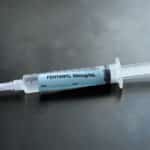- Can Stimulant Medications Cause Weight Gain?
- Weight Gain & ADHD
- Stimulant Abuse & Weight Gain
- Types Of Stimulant Medications
Stimulant medications are known to cause weight loss and loss of appetite, but they have also been linked to weight gain and an increased risk of obesity in adolescents who stop taking the medication.
Stimulant medications are most often used to treat attention-deficit hyperactivity disorder (ADHD) and attention deficit disorder (ADD).
Can Stimulant Medications Cause Weight Gain?
ADHD medications are known to curb appetite and even burn calories. However, stimulant medications have also shown to lead to eventual weight gain in adolescents who take them to treat ADHD early in life.
At first, there is weight loss and a normal to low body mass index (BMI), but as adolescents become adults, and potentially stop taking the medication, BMI may increase.
This BMI increase has even been a couple of points higher than kids who never took stimulant medications at all. However, it’s unclear exactly what the reason for this is.
Weight Gain & ADHD
Most people with ADHD gain weight after they quit taking stimulant medications. Once the medications wear off, appetite comes back with a vengeance and can lead to overeating, weight gain, and an increased risk of obesity.
In fact, it’s more likely that discontinuing the medication, along with the return of ADHD symptoms, actually plays a bigger role in weight gain than the medication itself.
A few ADHD symptoms that may contribute to weight gain include:
Hard Time Controlling Impulses
People with ADHD are 5 times more likely to have an eating disorder due to trouble controlling impulses. Eating disorders can include binging and overeating, which can lead to weight gain.
Executive Function Deficits
Maintaining a healthy weight requires strong executive functioning skills like setting up balanced meals and daily exercise. Anyone with ADHD doesn’t have the highest executive function and that could ultimately lead to gaining weight.
Low Levels Of Dopamine
People with ADHD have low levels of dopamine. Carbs, cakes, and cookies can provide a dopamine rush and, unfortunately, also lead to weight gain.
Lack Of Attention
Because one of the major ADHD symptoms is low attention span, you may not realize you’re full and keep eating, ultimately leading to higher body weight.
Stimulant Abuse & Weight Gain
For those who abuse or are addicted to stimulant drugs, quitting them can also lead to weight gain. If you haven’t set up healthy eating habits, recovering from a stimulant addiction may lead to snacking, overeating, and weight gain.
Again, however, this type of weight gain is more related to getting off stimulants rather than being caused by the drugs themselves.
Types Of Stimulant Medications
There are many types and brands of stimulant medications. They all do pretty much the same thing, but healthcare providers may prescribe one over another based on your specific ADHD symptoms.
Most stimulant medications are classified as schedule II controlled substances by the DEA/FDA. This means they have a high potential for abuse and can lead to psychological and physical dependence.
Some of the most common stimulant medications include:
- amphetamine/dextroamphetamine (Adderall)
- dextroamphetamine (Dexedrine, ProCentra, Zenzedi)
- dexmethylphenidate (Focalin)
- methylphenidate (Ritalin)
- amphetamine sulfate (Evekeo)
- methylphenidate (Ritalin SR, Metadate ER, and Methylin ER)
- amphetamine (Dyanavel XR)
- dexmethylphenidate (Focalin XR)
- dextroamphetamine (Adderall XR)
- lisdexamfetamine (Vyvanse)
- methylphenidate (Concerta, Quillivant XR, Quillichew ER, and Ritalin LA)
- serdex methylphenidate/dexmethylphenidate (Azstarys)
Side Effects Of Stimulant Medications
Besides weight loss or weight gain, stimulant use can come with a number of different side effects.
Some of the most common side effects may include:
- sleep problems
- loss of appetite/appetite suppression
- weight loss
- high blood pressure
- dizziness
- headaches
- stomachaches
- psychosis/mental health conditions
- irritability
- nervousness
If you or a loved one is struggling with stimulant addiction or another form of drug addiction, please contact us to learn about our outpatient treatment options.
Sources
- https://publications.aap.org/pediatrics/article-abstract/133/4/668/32789/Attention-Deficit-Disorder-Stimulant-Use-and?redirectedFrom=fulltext
- https://psychnews.psychiatryonline.org/doi/full/10.1176/appi.pn.2014.5a2
- https://www.ncbi.nlm.nih.gov/pmc/articles/PMC4041868/
- https://www.reuters.com/article/us-adhd-medications/adhd-medications-tied-to-teenage-weight-gain-idUSBREA2H1HD20140318
Written by
Northeast Addition Editorial Team
©2024 Northeast Addition Center | All Rights Reserved
This page does not provide medical advice.



